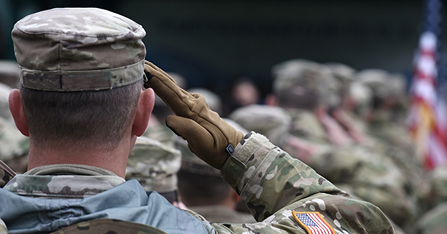It is important for veterans to know that non-combat related disabilities sustained during active duty may qualify them for VA disability benefits. Any injuries sustained while on base or even while at home or out in the community during active duty may serve as the basis for non-combat disability claims.
Regardless of whether you need advice on how to submit an effective application or you have already been rejected by VA, our team can help. Let one of our VA-accredited lawyers help you appeal your non-combat disability claims.

Contact Us Today
We Will Fight For Your Benefits
We guarantee 100% privacy. Your information will not be shared.
VA’s Standard of Proof
A veteran must prove that they have a formal diagnosis of their disabling condition as well as demonstrate that their non-combat injury is directly related to their active duty service. Establishing these crucial elements and proving entitlement to service-connection can be extremely difficult without dedicated legal counsel.
Common Types of Claims
There is a wide variety of service-related disabilities that are eligible for VA disability compensation. Examples of compensable non-combat disabilities include but are not limited to:
- Heart disease
- Lung disease
- Arthritis and other musculoskeletal injuries
- Cancer
- Diabetes
There may be evidence of a veteran’s diagnosis and treatment of a non-combat condition in their active duty service records. For example, if a servicemember broke their leg during a training exercise, there would likely be documentation of that, and a claim for disability benefits can be filed based on that evidence.
VA also has a list of presumptive conditions which automatically qualify a veteran for disability benefits if they manifest to at least 10 percent disabling within one year of leaving active duty service (or sometimes longer than one year in certain situations). For example, service connection might be presumed for non-combat injuries such as tinnitus or hypertension.
In other words, a claim may be approved where the VA can assume that the applicant’s active duty service caused their injury or disease. If VA denied your non-combat disability claim, a seasoned lawyer from our firm can help you challenge the agency’s decision.

Appeal Process for Benefit Denials
For non-combat disability claims denied on or after February 19, 2019, applicants must adhere to the procedures outlined in the Appeals Modernization Act (AMA). This law allows veterans to file a direct notice of disagreement on VA Form 10182 to request review by the Board of Veterans’ Appeals.
Former servicemembers who were denied before the specified date must file a legacy Notice of Disagreement with a local VA office before their case can be heard by a Veterans Law Judge. In either case, a veteran seeking to appeal VA’s decision on their application for benefits should consult an attorney from VetLaw’s team.
Learn More about Non-Combat Disability Claims from an Attorney
If you are preparing to file a Supplemental Claim for benefits, out team of steadfast lawyers can offer substantial insight about what evidence to include in non-combat disability claims. We can also help you with every step of the appeals process for disability compensation if you have already received a denial, including preparing for a hearing before the Board of Veterans’ Appeals. For help with your case, schedule a consultation with an attorney from our firm as soon as possible.

